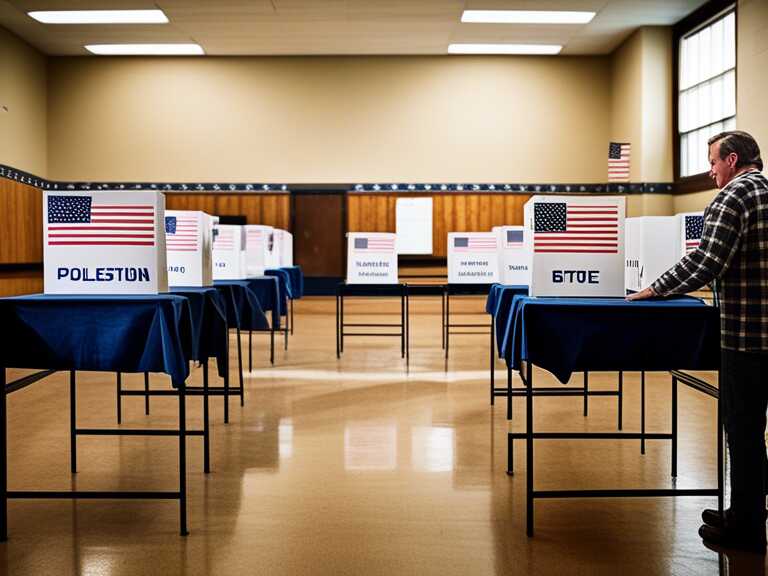
Wisconsin Elections Commission Keeps Robert F. Kennedy Jr. on November Presidential Ballot
Wisconsin Elections Commission voted to keep Robert F. Kennedy Jr. on the presidential ballot, despite his plans to withdraw from key battleground states.

The Wisconsin Elections Commission recently voted to keep Robert F. Kennedy Jr. on the state's November presidential ballot, despite the former third-party candidate's plans to remove his name from key battleground states in the upcoming 2024 presidential election. The decision was made in accordance with state law, which dictates that any person who files nomination papers and qualifies to appear on the ballot may not decline nomination. This ruling has thwarted Kennedy's intention to withdraw his name from ballots in critical states that could potentially decide the outcome of the election.
Impact on the Election Landscape
The Wisconsin Elections Commission's decision to keep Kennedy's name on the ballot has significant implications for the upcoming presidential election. The state's law clearly outlines the process for candidates appearing on the ballot, and the commission's ruling demonstrates its adherence to these legal obligations. By maintaining Kennedy's presence on the ballot, the commission has ensured that voters in Wisconsin will have the opportunity to cast their votes for him, regardless of his subsequent attempts to remove himself from consideration in select battleground states.
Kennedy had initially suspended his campaign and endorsed Republican nominee Donald Trump for president, claiming that his name would remain on the ballots in most states. However, he expressed his intention to withdraw from about ten battleground states, asserting that his presence in these locations would act as a spoiler. This strategy was perceived as an effort to assist Trump by eliminating the option for Kennedy voters to cast their ballots in these highly competitive states, where even a small number of votes could determine the outcome.
Polling data suggested that Kennedy's withdrawal from the race could potentially benefit Trump more than it would his opponent, the Democratic nominee Vice President Kamala Harris. This is attributed to Kennedy's stronger appeal among Republicans compared to Democrats. However, the effectiveness of this strategy hinges on the absence of Kennedy's name from the ballot, preventing voters from choosing him as an alternative candidate. As such, his attempts to secure his exclusion from the ballot in key battleground states were integral to this tactic.
Challenges to Kennedy's Strategy
Despite Kennedy's efforts to remove his name from the ballot in critical states, his strategy is not unfolding as intended. In states such as Wisconsin, Michigan, and North Carolina—key battlegrounds—Kennedy's name will likely remain on the ballot through November. This unforeseen development poses a challenge to Kennedy's plan to strategically withdraw from these battlegrounds in a bid to consolidate support for Trump.
In Michigan, Kennedy secured a spot on the ballot as the nominee of the Natural Law Party. However, due to state law, it is now too late for the party to select new electors, resulting in Kennedy's name remaining on the ballot. Similarly, in North Carolina, Kennedy is set to appear on the ballot as the We The People Party's nominee. Despite his attempts to withdraw, the party has yet to inform the State Board of any plans to alter its nomination, thus leaving Kennedy's name on the ballot.
Furthermore, Kennedy's name will be removed from the Nevada ballot, following a district court ruling. This decision came after a challenge brought by two Nevada voters seeking to have Kennedy removed from the state's ballot. While Kennedy has successfully withdrawn his candidacy in Arizona, Florida, Ohio, and Texas, his name will likely still appear on the ballots in Pennsylvania and Georgia, where his candidacy was under legal dispute at the time of his campaign suspension.
The Road Ahead
As the presidential election approaches, the Wisconsin Elections Commission's decision to uphold Kennedy's candidacy on the state's ballot ensures that he will remain a factor in the electoral landscape. Kennedy's attempts to withdraw from critical battleground states have encountered obstacles, resulting in his continued presence on the ballot in these locations. The political implications of this development will undoubtedly shape the dynamics of the election as candidates and parties adapt to the evolving circumstances.
The outcome of the 2024 presidential election will be influenced by the decisions made by key electoral bodies, as well as the strategies employed by candidates to navigate the complexities of the electoral process. The interplay between legal requirements, voter preferences, and party affiliations will ultimately determine the trajectory of the election, and the impact of Kennedy's presence on the ballot will be a crucial factor to consider in analyzing the electoral landscape.
The Role of Battleground States
Battleground states play a pivotal role in determining the outcome of presidential elections, often swinging the results in favor of one candidate or another. With Kennedy's name remaining on the ballot in battleground states such as Wisconsin, Michigan, and North Carolina, the potential for his candidacy to influence the electoral outcome in these critical locations cannot be underestimated. Voter sentiment and preferences in these states will be closely scrutinized as candidates and analysts seek to gauge the impact of Kennedy's continued presence on the ballot.
Share news















